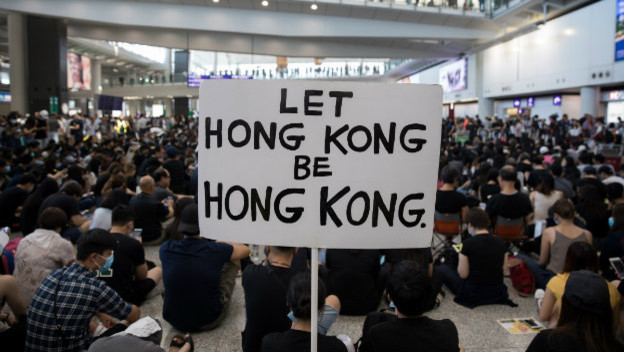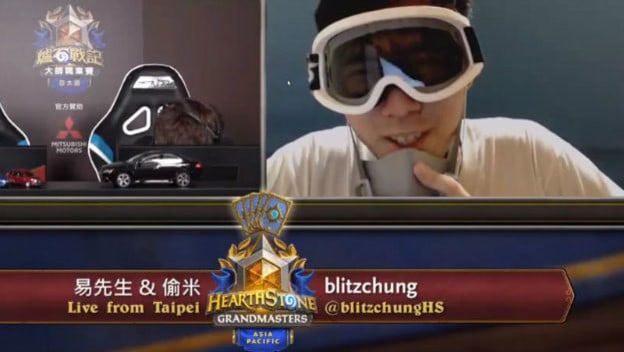Activision Blizzard managed to step in it yet again in 2019, but this time it wasn’t just normal video game drama. While the 2018 BlizzCon fiasco involved a bunch of gamer rage over a Diablo mobile game, this BlizzCon is about to be inundated with Chinese-adjacent politics. As it turns out, China is a complicated matter both in and outside of gaming. How does it pertain to us? Well, it could affect developers and publishers, both in terms of content and finances. But it could also impact gamers, by way of being manipulated via outside political agendas.
China, which has an explosive, growing presence in the games industry, is currently experiencing mass demonstrations in Hong Kong. Due to events at a major Hearthstone tournament, Blizzard got dragged right into everything. Winner Blitzchung, during the routine victory celebrations, donned a mask (like many Hong Kong protestors wear to defend against things like tear gas), and gave a brief statement of support for the demonstrators. Blizzard yanked his winnings, suspended him for a year, and terminated its working relationship with the casters. The massive company scorched the Earth, and all Hell broke loose.
The story made an instant impact, becoming one of the hottest topics of conversation and discourse. People on either side of the right/left political dichotomy were equally angry with Blizzard, as this action somehow simultaneously hit both ends of the Western political spectrum square in the values. On one side, you had the free speech crowd riled up. On the other, you had folks appalled that Blizzard would attempt to make such a visibly politically motivated action apolitical. Blizzard then released a statement, at 5:30 PM on a Friday no less, walking back the punishments slightly and running for cover under the weekend.
Part of what caused this uproar is timing. Even before the protests in Hong Kong started, folks in and around the tech and entertainment industries have grown wary of China’s increasing hand on the pocketbooks. China’s current government has extremely intense speech and expression laws, with straight-up bans on specific kinds of content. At the same time, Chinese investment money has found its way to American companies, which of course have much less strict restrictions. Companies like Tencent own stakes in video game publishers, and on multiple occasions have demanded changes to in-game content. Some changes have applied only to Chinese versions of games, while others have required separate builds of games entirely.
Other cases have seen changes to games globally, although in some cases that has been walked back. It’s also happening in Hollywood. Big movies from the likes of Disney having entire extra scenes filmed for the China or marketing moves made to appeal specifically to the country to soak in that massive, growing source of revenue. It’s happening in the sports world too, with the NBA coming under fire just before all this Blizzard drama, as it cracked down on players making statements in support of the same Hong Kong protest groups.
With the visibility of the NBA and Activision Blizzard, some of the wealthiest corporations in the world have taken notice, including politicians. For example, US Senators Marco Rubio (R-Florida) and Ron Wyden (D-Oregon) both lambasted Blizzard for its actions. It’s worth noting, especially with Rubio, that many politicians on the right have been clutching their pearls about China for a long time now. They fear its growing economic power and the effect that could have on the global economy.

The gaming community isn’t always the most informed community, which is how stuff like GamerGate was able to happen. A combination of anti-intellectualism, anti-journalism, and a desperate need for validation have turned many online gaming communities into festering sores. When Blizzard made a China-related boo boo, something everyone could rally around, it makes sense that people like Rubio would take that new opportunity. The same community that ended up flip-flopping on Jack Thompson during GamerGate, now found a new avenue to get their concerns validated by real power. That’s dangerous, because shortsightedly latching on to politicians commenting on issues pertaining to video games is how we’ve ended up in a lot of weird places.
Personally, what Blizzard did is definitely a big problem. The way China has a growing political stranglehold on international media, such as games and movies, is probably in need of some checking. At the same time, this whole situation reeks of yellow peril, especially with pundits and politicians jumping into a space they hardly ever do otherwise. We should be wary of China’s growing influence over large corporations and how that impacts us as people on the ground, but we should also make sure our motivations are in check.
